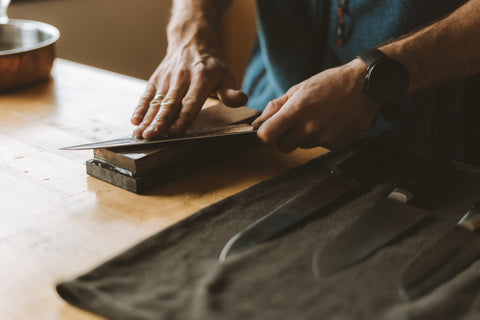Your Cart is Empty
fesitive sale , save additional 10% off 'festive10'
fesitive sale , save additional 10% off 'festive10'
Kitchen Knife Maintenance [An Ultimate Guide]
June 09, 2021 4 min read
Kitchen Knife Maintenance [An Ultimate Guide]
Knives are a part of almost every kitchen, so whether you are a professional cook or a home cook, you should know how to take care of them. Proper maintenance of kitchen knives will increase their life and make them long-lasting and minimize the chances of injuries.

Today, we will discuss some tips on kitchen knife maintenance that you can easily apply to keep your kitchen knives neat and clean.
Keep Your Knives Sharp
A dull knife is a useless knife because it wastes your time in the kitchen and makes it difficult for you to proceed with cutting tasks efficiently.
Here is why the sharpening of the knife is the essential element of kitchen knife maintenance.
A dull knife makes it boring to carry out the cutting tasks and often delays them.
With a dull knife, you will have to apply more energy and more pressure. So instead of facilitating you in the cutting tasks, the blunt knife makes them tense.
While applying pressure using the dull knives, the hand may slip. It may cause injuries that are often deeper than those you get from the sharp blades.

To facilitate your cutting task, it is better to take your dull knife to the professional and have it sharpened by him.
Honing:
So even if the knife is sharp, honing can realign the edge, making slicing of the skinny fruits and vegetables easy.
Consider The Surface You Cut On
When your knife is perfectly sharp, now it is time for you to start with the practical cutting process and see how it works. However, you should be super careful while choosing the cutting board or any other surface because it directly impacts the life of the knife.

It is a common observation that when you go with cutting boards, especially those made up of plastic Bamboo or wood, your knife remains efficient and sharp for a more extended period.
Let's look at some crucial points regarding the cutting surface that will help you keep your knives sharp.
Cutting surface:
The best cutting surfaces that will ensure the maximum safety of your knives are the cutting boards made up of softwood, especially Japanese Cypress.
A high-end cutting board works perfectly with the sharp knife and does not get damaged even when you proceed with the heavy cutting tasks.
If your cutting board is made up of more rigid material than the knife itself, it may not be the right choice for your knife.

Keep The Knife Clean
The way you clean the knives also determines their life. If your knife is not compatible with the dishwasher, you should never wash it in the dishwashing machine. Otherwise, it will be terrible abuse.
Why is cleaning the knives in the dishwasher not safe for the blade?
Even if your knife is dishwasher safe, you should not be washing and cleaning it in the dishwasher. Here are a few solid reasons for it.
The rattling that takes place within the dishwasher is not suitable for the life of a blade.
Sometimes the blade is fragile and often gets hurt. As a result, the sharpness of the blade reduces significantly, and it no longer remains efficient for detailed cutting tasks.
Even if your blade does not damage while washing the knife in the dishwasher, it will lose its shine and become dull.
Here you might want to ask:
What is the right way to clean the knife?
The answer is quite simple, i.e., wash your knife using hand-washing techniques. For this purpose, all you need to do is to add some detergent or mix dishwashing soap in hot water and then wash the knives physically, one by one.
Detailed cleaning and washing of the knives separately will keep the blade efficient and sharp.
The Pro Tip?
If you immediately clean the knife after washing, it will further ensure the safety of the blades. So use a soft cloth to dry the blade of the knife.
The more you keep the blade of the knife away from humidity and wetness, the longer life and efficiency of the edge you can enjoy.
If you live in a humid area, you should use serious techniques to keep your knives dry.
Keep your knives covered and in the air free-storage boxes.
Use silica gel or other desiccants that serve as the drying agents, keeping your knives dry.
If you do not have access to any drying agent, you can take solid plastic bags without any holes and then keep your knives in them. Make sure to close them tightly so no air can get inside.
Light oiling of the knives also works in some cases and protects your blades coming directly in touch with air.
Some knives are made up of high-quality stainless steel blades that are often rust-free and corrosion-free. You can use air drying techniques for these knives without worrying about any blade protection.
Know Where To Store Your Knife
We have already discussed that the knives need a dry and clean place for storage. However, there are some other factors as well that you must consider while choosing the right and appropriate storage place for your knives.
Never store your knives with exposed blades in the drawer full of utensils. It will not only deteriorate the edges but can also cause serious injuries when handled carelessly.
Keeping your knives in the storage boxes is a safe option; however, you can also hang them using magnetic strips.
Final Verdict
When you know how to care for and maintain your knives properly, you will no longer need many of them in your kitchen. We have discussed the most basic do's and don'ts, so you have learned how to care for them, so they last.

